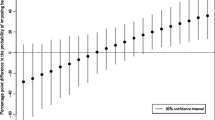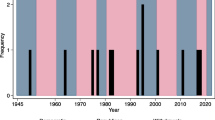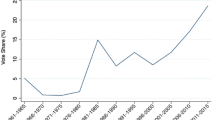Abstract
What influences parties’ issue attention towards immigration and integration? This study provides answers to this question by focusing on the party competition at the regional level in Germany, a country that has been strongly affected by the refugee crisis. Building on a novel data set which covers altogether 510 electoral manifestos during 108 federal and regional elections between 1990 and 2016, we assess the influence of party-specific, situational as well as structural factors on issue attention towards immigration and integration policies. Using descriptive statistics and regression analysis, we find that parties’ attention is significantly associated with citizens’ attention towards these issues. Furthermore, ideologically conflicting parties differ considerably in the share of their manifestos they devote to the issue. Interestingly, the electoral threat by populist radical right parties has no effect on the issue attention of mainstream competitors.





Similar content being viewed by others
Notes
Schmidtke offers a discussion of this argument with regard to the national level in Germany. (Schmidtke, O. (2015) 'Between populist rhetoric and pragmatic policymaking: The normalization of migration as an electoral issue in German politics', Acta Politica, 50(4), pp. 379–398).
We gratefully acknowledge the supply of electoral manifestos and coalition agreements by Thomas Bräuninger, Marc Debus and Jochen Müller Müller, J. (2013) 'On a Short Leash? Sub-National Party Positions between Regional Context and National Party Unity', Journal of Elections, Public Opinion & Parties, 23(2), pp. 177–199, Bräuninger, T. and Debus, M. (2012) Parteienwettbewerb in den deutschen Bundesländern. (unter Mitarbeit von Jochen Müller). Wiesbaden: VS Verlag für Sozialwissenschaften.
Note that DVU, NPD and AfD did not participate in all 118 elections.
The Politbarometer is conducted at least monthly by the Forschungsgruppe Wahlen, each survey comprising around 1250 respondents from the entire area of Germany.
We cannot discern empirically to what extent the problem perception of respondents refers to the migration of East Germans or other groups, as the categorization of the Politbarometer is partly too unspecific.
More precisely, we calculated the mean issue attention for each party by using all manifestos for state and national elections during a year.
References
Abou-Chadi, T. 2016. Political and Institutional Determinants of Immigration Policies. Journal of Ethnic and Migration Studies 42(13): 2087–2110.
Adam, I. 2013. Immigrant Integration Policies of the Belgian Regions: Sub-state Nationalism and Policy Divergence After Devolution. Regional and Federal Studies 23(5): 547–569.
Adams, J., and Z. Somer-Topcu. 2009. Policy Adjustment by Parties in Response to Rival Parties’ Policy Shifts: Spatial Theory and the Dynamics of Party Competition in Twenty-Five Post-War Democracies. British Journal of Political Science 39(04): 825–846.
Akkerman, T. 2012. Comparing Radical Right Parties in Government: Immigration and Integration Policies in Nine Countries (1996–2010). West European Politics 35(3): 511–529.
Akkerman, T. 2015. Immigration Policy and Electoral Competition in Western Europe: A Fine-Grained Analysis of Party Positions Over the Past Two Decades. Party Politics 21(1): 54–67.
Arzheimer, K. 2015. The AfD: Finally a Successful Right-Wing Populist Eurosceptic Party for Germany? West European Politics 38(3): 535–556.
Bäck, H., M. Debus, and H. Klüver. 2014. Bicameralism, Intra-party Bargaining, and the Formation of party Policy Positions: Evidence from the German Federal System. Party Politics 22(3): 405–417.
Bale, T., C. Green-Pedersen, A. Krouwel, K.R. Luther, and N. Sitter. 2010. If You Can’t Beat Them, Join Them? Explaining Social Democratic Responses to the Challenge from the Populist Radical Right in Western Europe. Political Studies 58(3): 410–426.
Böcker, A., and D. Thränhardt. 2003. Erfolge und Misserfolge der Integration-Deutschland und die Niederlande im Vergleich. Aus Politik und Zeitgeschichte 26: 3–11.
Bräuninger, T., and M. Debus. 2012. Parteienwettbewerb in den deutschen Bundesländern. (unter Mitarbeit von Jochen Müller). Wiesbaden: VS Verlag für Sozialwissenschaften.
Broughton, D. 2008. Frozen in the Centre, Melting at the Edges? The Landtagswahlen in Hesse and Lower Saxony, January 2008. German Politics 17(2): 203–211.
Budge, I., and D. Farlie. 1983. Party Competition—Selective Emphasis or Direct Confrontation? An Alternative View with Data. In West European Party Systems: Continuity and Change, ed. H. Daalder and P. Mair, 267–305. London: Sage.
Bundesregierung. 2007. Der nationale Integrationsplan. Neue Wege - neue Chancen.
Dandoy, R. 2014. Regionalist Parties and Immigration in Belgium. In The Politics of Immigration in Multilevel States. Governance and Political Parties, ed. E. Hepburn and R. Zapata-Barrero, 200–222. Basingstoke: Palgrave Macmillan.
Däubler, T. 2012. Wie entstehen Wahlprogramme? Eine Untersuchung zur Landtagswahl in Baden-Württemberg 2006. Zeitschrift für Politikwissenschaft 22(3): 333–365.
Deiss-Helbig, E. 2016. Digging the ‘Secret Garden of Politics’: An Exploration of the Role of Formal and Informal Candidate Selection Processes Regarding Ethnic Minority Representation. In Paper Presented at the ECPR Joint Sessions of Workshops in Pisa.
Downs, A. 1957. An Economic Theory of Democracy. New York: Harper.
Ezrow, L. 2007. The Variance Matters: How Party Systems Represent the Preferences of Voters. Journal of Politics 69(1): 182–192.
Ezrow, L. 2010. Linking Citizens and Parties. How Electoral Systems Matter for Political Representation. Comparative Politics. New York, NY: Oxford University Press.
Friedrich, L., and S. Waibel. 2012. Local Integration Concepts in Germany. Diffusion of an Integration Model? IMIS-Beiträge H. 41: 53–72.
Golder, M., and J. Stramski. 2010. Ideological Congruence and Electoral Institutions. American Journal of Political Science 54(1): 90–106.
Green, S. 2013. Germany: A Changing Country of Immigration. German Politics 22(3): 333–351.
Green-Pedersen, C. 2007. The Growing Importance of Issue Competition: The Changing Nature of Party Competition in Western Europe. Political Studies 55: 607–628.
Green-Pedersen, C., and P.B. Mortensen. 2014. Avoidance and Engagement: Issue Competition in Multiparty Systems. Political Studies 63(4): 747–764.
Green-Pedersen, C., and S. Otjes. 2017. A Hot Topic? Immigration on the Agenda in Western Europe. Party Politics 1354068817728211.
Han, K.J. 2015. The Impact of Radical Right-Wing Parties on the Positions of Mainstream Parties Regarding Multiculturalism. West European Politics 38(3): 557–576.
Henkes, C., and S. Kneip. 2010. Von offener Neutralität zu (unintendiertem) Laizismus. Leviathan 38(4): 589–616.
Hepburn, E., and D. Hough. 2012. Regionalist Parties and the Mobilization of Territorial Difference in Germany. Government and Opposition 47(1): 74–96.
Herbert, U. 2001. Geschichte der Ausländerpolitik in Deutschland: Saisonarbeiter, Zwangsarbeiter, Gastarbeiter, Flüchtlinge. München: C.H. Beck.
Koopmans, R. 2005. Contested Citizenship. Immigration and Cultural Diversity in Europe. Social Movements, Protest, and Contention. Minneapolis: University of Minnesota Press.
Massetti, E. 2015. Mainstream Parties and the Politics of Immigration in Italy: A Structural Advantage for the Right or a Missed Opportunity for the Left? Acta Politica 50(4): 486–505.
Meguid, B.M. 2005. Competition Between Unequals: The Role of Mainstream Party Strategy in Niche Party Success. American Political Science Review 99(03): 347–359.
Meguid, B.M. 2008. Party Competition Between Unequals. Strategies and Electoral Fortunes in Western Europe. Cambridge Studies in Comparative Politics. Cambridge: Cambridge University Press.
Müller, J. 2013. On a Short Leash? Sub-national Party Positions Between Regional Context and National Party Unity. Journal of Elections, Public Opinion and Parties 23(2): 177–199.
Niedermayer, O. (ed.). 2015. Die Parteien nach der Bundestagswahl. Wiesbaden: Springer VS.
Odmalm, P. 2011. Political Parties and ‘the Immigration Issue’: Issue Ownership in Swedish Parliamentary Elections 1991–2010. West European Politics 34(5): 1070–1091.
Odmalm, P., and T. Bale. 2015. Immigration into the Mainstream: Conflicting Ideological Streams, Strategic Reasoning and Party Competition. Acta Politica 50(4): 365–378.
Odmalm, P., and B. Super. 2014. Getting the Balance Right? Party Competition on Immigration and Conflicting Ideological ‘Pulls’. Scandinavian Political Studies 37(3): 301–322.
Petrocik, J.R. 1996. Issue Ownership in Presidential Elections, with a 1980 Case Study. American Journal of Political Science 40(3): 825–850.
Reher, S. 2015. Explaining Cross-National Variation in the Relationship Between Priority Congruence and Satisfaction with Democracy. European Journal of Political Research 54(1): 160–181.
Rovny, J. 2012. Who Emphasizes and Who Blurs? Party Strategies in Multidimensional Competition. European Union Politics 13(2): 269–292.
Schmidtke, O. 2015. Between Populist Rhetoric and Pragmatic Policymaking: The Normalization of Migration as an Electoral Issue in German Politics. Acta Politica 50(4): 379–398.
Schönwälder, K. 2001. Einwanderung und ethnische Pluralität. Politische Entscheidungen und öffentliche Debatten in Großbritannien und der Bundesrepublik von den 1950er bis zu den 1970er Jahren. Essen: Klartext.
Schröder, V., and C. Stecker. 2017. The Temporal Dimension of Issue Competition. Party Politics 1354068817693474.
Spoon, J.-J., and H. Klüver. 2014. Do Parties Respond? How Electoral Context Influences Party Responsiveness. Electoral Studies 35: 48–60.
Super, B. 2015. Goldilocks and the Entrepreneurs: Mainstream Party Strategies on Immigration in Flanders and The Netherlands. Acta Politica 50(4): 417–441.
Thränhardt, D. 1995. The Political Uses of Xenophobia in England, France and Germany. Party Politics 1(3): 323–345.
van de Wardt, M., C.E. De Vries, and S.B. Hobolt. 2014. Exploiting the Cracks: Wedge Issues in Multiparty Competition. The Journal of Politics 76(04): 986–999.
van Heerden, S., S.L. de Lange, W. van der Brug, and M. Fennema. 2014. The Immigration and Integration Debate in the Netherlands: Discursive and Programmatic Reactions to the Rise of Anti-immigration Parties. Journal of Ethnic and Migration Studies 40(1): 119–136.
Wagner, M., and T.M. Meyer. 2014. Which Issues do Parties Emphasise? Salience Strategies and Party Organisation in Multiparty Systems. West European Politics 37(5): 1019–1045.
Acknowledgements
We thank Vinzent Leitgeb, Marius Michel, Magdalena Pulz, Sebastian Riedl and Ellen Schmitt for valuable research assistance. We also thank the three anonymous reviewers for their fruitful comments on the paper. An earlier version of this article was presented at the EPSA General Conference, 25–27 June 2015 in Vienna.
Author information
Authors and Affiliations
Corresponding author
Appendix
Appendix
Competence attribution by voters. Figure shows how voters have rated the competence of different parties in the area of immigration and integration policies. More specifically, respondents in the Politbarometer were asked to indicate the party they deemed most competent in this area. Unfortunately, the question was only asked for 21 elections, so that we could not integrate the data into the multivariate test. As can be seen, there has long been a head-to-head race between the two main parties, CDU and SPD, about the ownership of the issue. Though the data should be interpreted with care, more recently the CDU seem to have lost competence in the eye of the voters
Rights and permissions
About this article
Cite this article
Kortmann, M., Stecker, C. Party competition and immigration and integration policies: a comparative analysis. Comp Eur Polit 17, 72–91 (2019). https://doi.org/10.1057/s41295-017-0108-8
Published:
Issue Date:
DOI: https://doi.org/10.1057/s41295-017-0108-8





